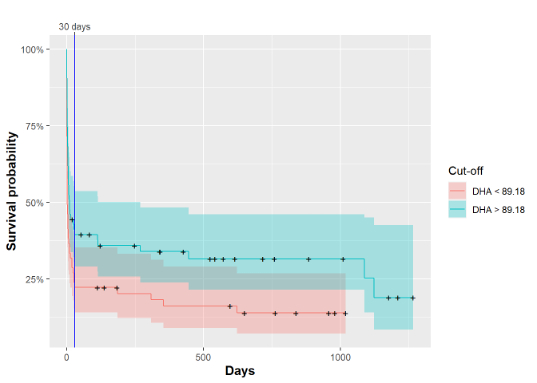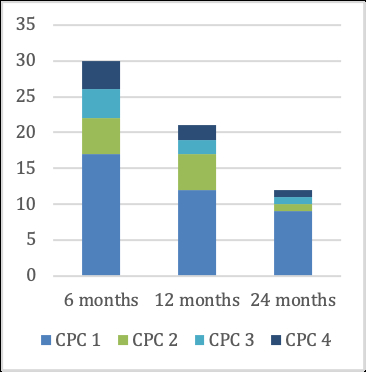Final ID: Sa1303
Docosahexaenoic acid (DHA) serum concentrations predict outcome following Out-of-Hospital Cardiac Arrest (OHCA)
Abstract Body: Background Out of hospital cardiac arrest (OHCA) survival rates remain low with neurological outcome being a major concern. Docosahexaenoic acid (DHA) is an omega-3 fatty acid mediating cardio and neuro protection through anti-oxidative and anti-inflammatory properties. Although DHA supplementation is recommended for various cardiac pathologies the impact on OHCA remains to be elucidated.
Methods Blood samples from 151 patients treated for OHCA by the EMS of Bonn and Rhein-Sieg-County were collected immediately after ROSC. DHA serum concentrations were analyzed using mass spectrometry and QuantSeq mRNA sequencing was used to evaluate gene expression and transcriptomics. Medical records were reviewed and neurological outcomes evaluated until 2 years after OHCA. IRB Univ Bonn 137/18.
Results DHA concentrations were higher in survivors compared to diseased patients throughout the observational period. Univariate analysis indicated significant higher DHA concentrations 6 and 12 months after OHCA while there was no statistical difference at 24 months (6 months: 109 ± 40 vs. 94 ± 56, p < 0.05; 12 months: 111 ± 42 vs. 94 ± 42, p < 0.05; 24 months 101 ± 49 vs. 95 ± 52 nmol/ml). However, now flow time, CPR duration, and age were significantly lower in survivors and incidence of shockable rhythm higher all in favor of good outcome. Using a logistic regression model including DHA concentration, age, gender, no-flow time, CPR duration, CPR during transport, and initial rhythm, DHA does not contribute significantly to survival (p = 0.57, OR 0.68). As indicated by this model, most impact on negative outcome is contributed by longer no-flow time (p = 0.006, OR 1.3) and initial rhythm (asystole, EMD, p = 0.01, OR = 0.1).
Neurological outcome was favorable as indicated by CPC score 1 and 2 in 71% of survivors at 6 months and 77% at 12 and 24 months. Similarly, independency for activities of daily life as represented by Barthel index 85, applied for 71% after 6 months and 77% after 12 and 24 months, respectively. However, Barthel Index did not correlate with DHA levels in a significant matter (p = 0.33, r = 0.18). No gene expression or transcriptomics differences were observed.
Conclusion DHA levels were significantly higher in the surviving group, but this effect could not be shown in multivariate analysis or in correlation with neurological outcome. Due to limited study size, DHA effects are probably underlying and need more evaluation in future.
Methods Blood samples from 151 patients treated for OHCA by the EMS of Bonn and Rhein-Sieg-County were collected immediately after ROSC. DHA serum concentrations were analyzed using mass spectrometry and QuantSeq mRNA sequencing was used to evaluate gene expression and transcriptomics. Medical records were reviewed and neurological outcomes evaluated until 2 years after OHCA. IRB Univ Bonn 137/18.
Results DHA concentrations were higher in survivors compared to diseased patients throughout the observational period. Univariate analysis indicated significant higher DHA concentrations 6 and 12 months after OHCA while there was no statistical difference at 24 months (6 months: 109 ± 40 vs. 94 ± 56, p < 0.05; 12 months: 111 ± 42 vs. 94 ± 42, p < 0.05; 24 months 101 ± 49 vs. 95 ± 52 nmol/ml). However, now flow time, CPR duration, and age were significantly lower in survivors and incidence of shockable rhythm higher all in favor of good outcome. Using a logistic regression model including DHA concentration, age, gender, no-flow time, CPR duration, CPR during transport, and initial rhythm, DHA does not contribute significantly to survival (p = 0.57, OR 0.68). As indicated by this model, most impact on negative outcome is contributed by longer no-flow time (p = 0.006, OR 1.3) and initial rhythm (asystole, EMD, p = 0.01, OR = 0.1).
Neurological outcome was favorable as indicated by CPC score 1 and 2 in 71% of survivors at 6 months and 77% at 12 and 24 months. Similarly, independency for activities of daily life as represented by Barthel index 85, applied for 71% after 6 months and 77% after 12 and 24 months, respectively. However, Barthel Index did not correlate with DHA levels in a significant matter (p = 0.33, r = 0.18). No gene expression or transcriptomics differences were observed.
Conclusion DHA levels were significantly higher in the surviving group, but this effect could not be shown in multivariate analysis or in correlation with neurological outcome. Due to limited study size, DHA effects are probably underlying and need more evaluation in future.
More abstracts on this topic:
Plasma Metabolomics and Machine Learning Identify Causal Metabolic Contributors to Incident Heart Failure in 38,628 MGB Biobank Participants
Chebrolu Bhavya, Choksi Priyam, Kotanidis Christos, Weber Brittany, Lasky-su Jessica, Karlson Elizabeth, Hegde Sheila, Buckley Leo
Dietary N-3 Very-Long-Chain Polyunsaturated Fatty Acids Improve Retinal Function And Reduce Aortic Atherosclerosis In ApoE-Deficient MiceYang Zhihong, Rojulpote Krishna Vamsi, Tang Jingrong, Xie Hairui, Shi Zhen-dan, Swenson Rolf, Swaroop Anand, Remaley Alan, Kun Julia, Pryor Milton, Brock Daniel, Mondal Anupam, Lydic Todd, Sato Seizo, Yamazaki Isao, Yamaguchi Hideaki



